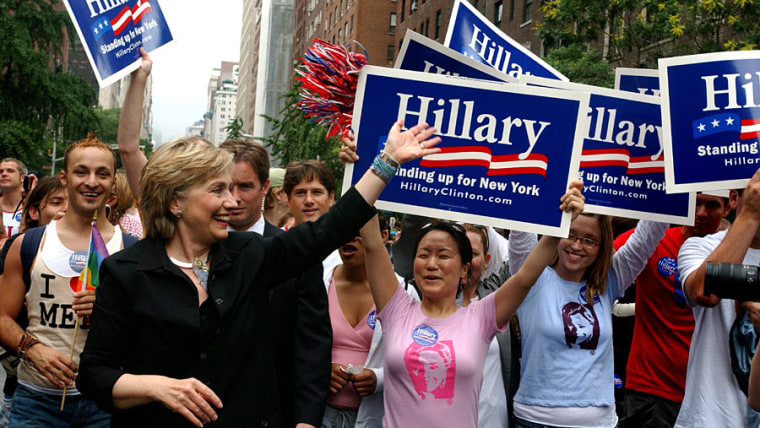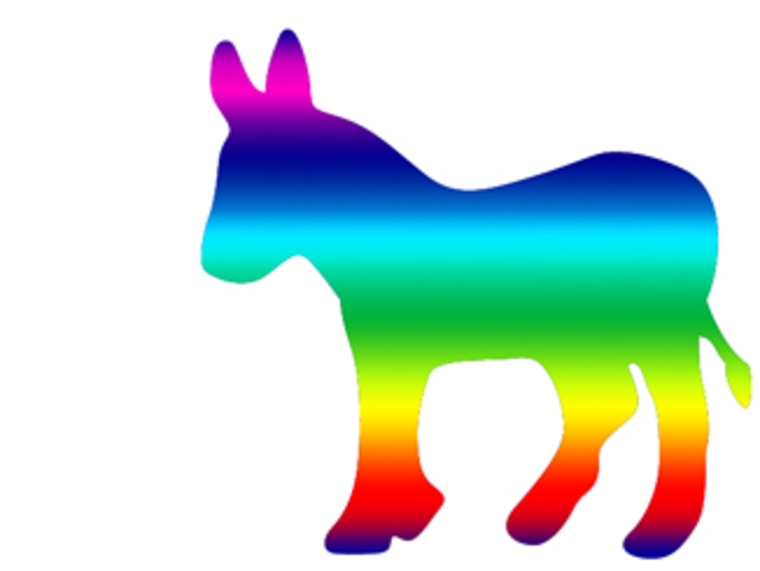This morning, Sen. Barack Obama of Illinois announced his "National LGBT (Lesbian Gay, Bisexual, Transgender) Leadership Council." Sen. Hillary Rodham Clinton of New York unveiled "LGBT Americans for Hillary" weeks ago. All the candidates have position papers detailing their support for gay rights. And for the first time tonight, all but Sens. Joseph Biden of Delaware and Christopher Dodd of Connecticut (who cited scheduling conflicts) will take part in a televised forum in which gay and lesbian activists will grill them on same-sex marriage, sex education, gays in the military and more.
Just one presidential election ago, Democrats squirmed when pressed to say if they supported same-sex marriage. Back then, religious conservatives were on the warpath, flocking to the polls to vote for state measures banning civil unions and same-sex marriage. Some Democrats still believe the gay marriage ban on the ballot in Ohio cost John Kerry the election.
These days, the political climate has changed. Opposition to the war has diminished Republicans' political power. Public tolerance for gay rights has reached an all-time high, according to a recent Gallup poll, and many Democrats are embracing the cause of gay rights more actively than ever before.
But have those new conditions changed the Democratic candidates' views on gay marriage? Not so much.
Only two of the hopefuls -- Rep. Dennis Kucinich of Ohio and former Sen. Mike Gravel of Alaska -- support same-sex marriage outright. All of the others say they are for civil unions with spousal rights and privileges, but not marriage itself.
Former North Carolina Sen. John Edwards, who has courted gay and lesbian voters aggressively, was pressed to explain his position at the recent YouTube debate. "I feel enormous conflict about it," he conceded. "This is a very difficult issue for me." He also pointed out that his wife supports same-sex marriage, a husband and wife split that some believe was strategically planned to soften the impact of Edwards' own views.
Edwards' former political consultant, Robert Shrum, wrote that Edwards once said of gays, "I'm not comfortable around those people," a story Edwards and his campaign have heatedly denied. In a questionnaire from the Human Rights Campaign, a gay and lesbian rights group, Edwards spelled out his strong support for civil unions: "I believe that couples in committed, long-term relationships should have the same rights, benefits, and responsibilities, whether they are straight couples or same-sex couples."

Clinton and Obama have cited their religious beliefs to explain their opposition to same-sex marriage. In the YouTube debate, Obama said he believes "it's up to the individual denominations to make a decision as to whether they want to recognize marriage or not. But," he went on, "in terms of... the rights of people to transfer property, to have hospital visitation, all those critical civil rights that are conferred by our government, those should be equal."
In an apparent effort to soften her own position, Clinton took the unusual step of distancing herself from her husband, who signed into law the 1996 Defense of Marriage Act. DOMA allows states to decide whether to recognize same-sex marriages and prohibits the federal government from recognizing such marriages. Clinton recently announced that she would repeal the federal provision, arguing it could threaten the federal benefits of gay couples. Obama went further, saying he would repeal the Defense of Marriage Act altogether.
On other issues, most of the candidates are in sync with the gay and lesbian community -- and have gone beyond their previous positions promoting gay rights. All support the following ideas:
- Repealing former President Bill Clinton's "Don't Ask, Don't Tell" policy, which prevents openly gay people from serving in the military;
- A federal law which would prohibit workplace discrimination based on sexual orientation or gender identity;
- Extending federal benefits to domestic partners;
- Extending the federal
- Changing the Social Security system to provide survivor benefits for same-sex partners;
- More funding for HIV/AIDS;
- Expanding the federal hate crimes law to include crimes based on sexual orientation;
- The REAL Act, which would establish a federal sex education program that includes information about condom use.
Still, some candidates have managed to get themselves into trouble with gay and lesbian constituents this year. Both Clinton and Obama fumbled when asked about the statement by then-Joint Chiefs of Staff chairman Peter Pace, who said homosexuality is "immoral." And New Mexico Gov. Bill Richardson, who has pushed through laws strengthening gay rights in his state, was forced to explain something he said on the now-defunct Don Imus radio show: Exchanging barbs with the shock jock, Richardson called Imus a "maricon." A gay lesbian group said that is Spanish for "faggot"; Richardson insisted it just means "gay".
The Republican presidential candidates, some of whom support a ban on same-sex marriage, declined to appear at tonight's forum. None wanted to comment on the Democrats' decision to be there.
